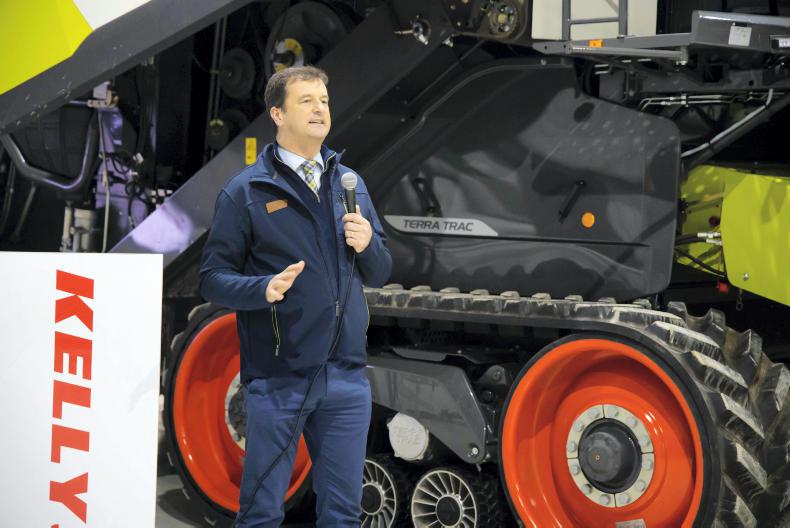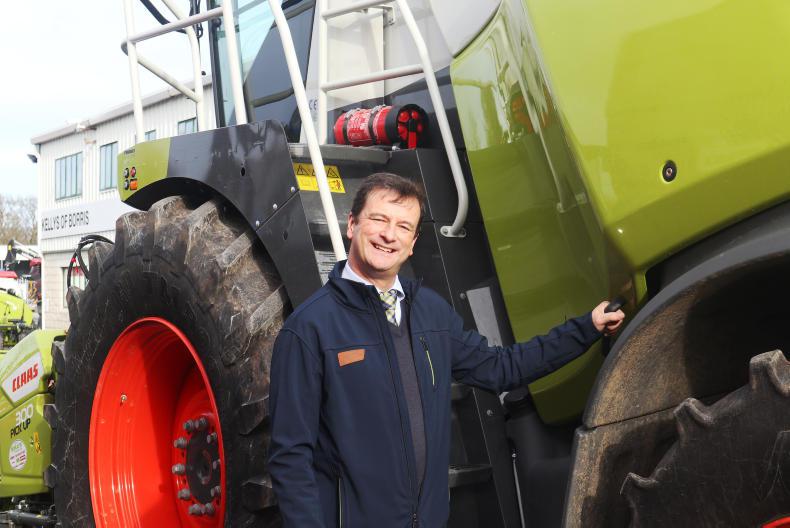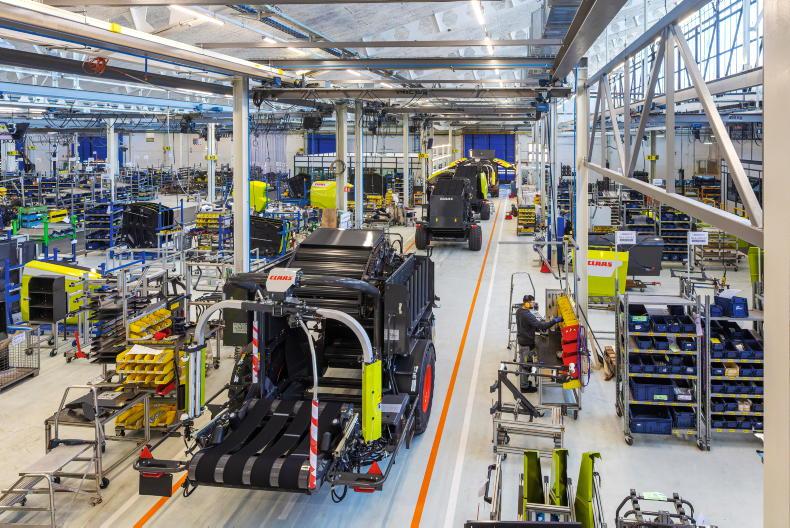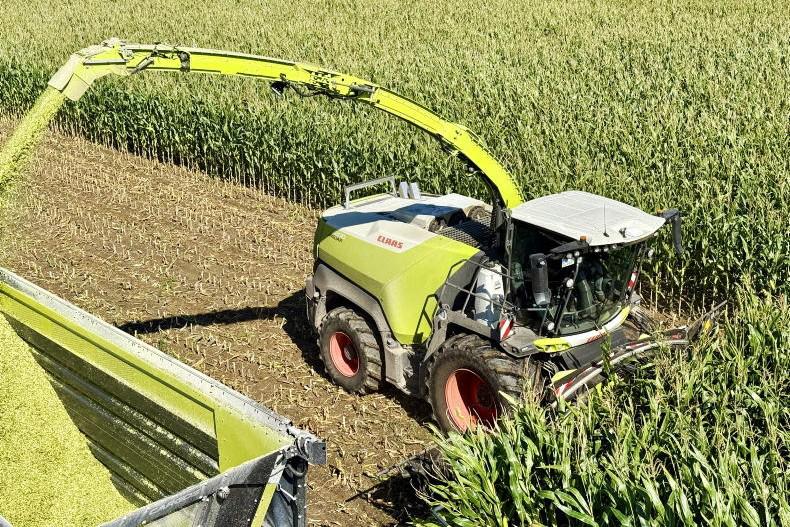On 1 October 2009, the importer/distributor model at the time for all Claas products, Harvest Machinery, was switched to a new division of Claas UK, known as Claas Ireland.
Roll the clock forward 10 years to 2019, and Claas has just celebrated its strongest ever financial year in Ireland, turning over a record €44.6m here. At Kelly’s open days in Borris last week, we caught up with CEO Trevor Tyrrell to find out more.
Was moving to a subsidiary model the correct move?
Honestly speaking, at the time we were very nervous. The Celtic Tiger had just collapsed and the business had fallen back. In Harvest Machinery’s last year, they turned over €12m. In our first year, we managed to match this. At that point, our goal was to grow the business in Ireland to a turnover of €15m to €20m.
Our 2019 financial year finished at the end of September. It shows that we turned over €44.6m in Ireland last year, a record year for us. We grew the business by almost four times, which was something we never imagined we could do. However, last year was an exceptional year for both sales of foragers and tractors.
In 2009, we had 13 dealers across 13 locations. Today, we have 10 dealers across 14 locations
Has there been any change to the Claas dealer structure since 2009?
In 2009, we had 13 dealers across 13 locations. Today, we have 10 dealers across 14 locations. All our dealers are family owned businesses. There has been a number of changes down through the years with our dealers. Four are full-line dealers while the remaining six offer tractors, telehandlers and the greenline products.
Our most recent appointment to the network is Ardagh Agri Services as a new dealer for Co Mayo. Based at Ballina, David Breslin and his team will be offering full sales, service and parts support for the Claas tractor and green harvest product range. The firm was appointed on 1 October and is already in double figures as regards sales of Claas machines.
What did Claas Ireland bring that Harvest Machinery didn’t offer?
The two big things Claas Ireland offered were our own finance and a shorter lead time on parts. As regards finance, we partnered with BNP Paribas SA, a French international banking group. At the time, most firms were closing their finance companies while we were in fact opening one. People thought we were mad. At the time, it wasn’t just our finance rate that attracted people but it was the availability of credit. At the end of the day, 90% of what we sell is financed.
We have been getting busier and busier on the finance side of things. That’s because we don’t just finance Claas machines, but every brand that a Claas dealer sells, even if it’s a different brand of used tractor that we’ve traded in.

Trevor Tyrrell, CEO of Claas Ireland and UK. \Patrick Browne
We are currently interviewing in Ireland to employ a fourth person to our financing team. We are prepared and willing to finance anything a Claas user has purchased, within reason. For example, if a customer has bought a new Land Rover, we are prepared to finance that. We already do a lot of this in the UK. So there will not even be any legal changes, so really nothing at all changes.
At the end of the day, 90% of what we sell is financed
Claas Finance is VAT-registered in Ireland, and always has been so nothing changes from a tax point of view either.
When we took over Ireland, if a customer ordered a part on a Friday and it was in Germany, it would arrive in Ireland on the following Tuesday. This was completely unacceptable in this day and age. Today, we deliver parts from either Germany or the UK to our dealers in Ireland faster than Amazon Prime. For example, a 3pm parts order into Germany can get to any dealer in Ireland the next morning. And now, Friday orders from the UK are delivered on Saturday morning.
Why does Claas have an almost 50% larger market share for tractors in Ireland versus the UK?
In the UK, we simply don’t have the same dealer coverage as we have here in Ireland. In Ireland, we have 50% more dealers selling tractors and greenline than we do selling the full line. In the UK, it’s also much harder to find that family owned tractor dealership that’s widespread in Ireland. The UK is more corporate, something that we try to avoid where possible.
Today, we deliver parts from either Germany or the UK to our dealers in Ireland faster than Amazon Prime
Comparing 2009 to the current day, we now have fewer but stronger multi-branch dealers who offer better coverage throughout the country. Anywhere that we’ve lost a dealer over the years we’ve gained new dealers in better locations. Better coverage has helped to grow our Irish market share over the years.
Our aim is to get to 10% market share. Once we get there, we will be aiming for 15%. However, we never want to get to number one as we don’t want to lose our focus on the harvesting side of the business.
What’s your policy on attending machinery shows?
We will continue to invest in regional shows in Ireland and the UK to support our dealers. In Ireland, for example, this would include the FTMTA Farm Machinery Show. However, Claas won’t be returning to LAMMA. The money we would have spent on LAMMA, we will invest into our UK training academy – and we did, we invested £1.2m there two years ago.
In the UK, it’s also much harder to find that family owned tractor dealership that’s widespread in Ireland
We could potentially lose more business and more market share by not having a trained mechanic at the other end of a phone if a machine goes down rather than being at the LAMMA show. LAMMA is just too expensive. I don’t believe it’s needed either when we have such big shows such as Agritechnica and SIMA.
We have invested in our own show stand at our UK and Ireland HQ at Saxham in Suffolk. We are open year-round, and we recently welcomed two groups of farmers and contractors from Ireland where they could get right into the machines with our product specialists – much better than any show. We will continue investment in this site for the ultimate customer visit.
What do you think the next 10 years holds for Irish agriculture?
Post-Brexit, I don’t think people will stop eating or drinking. We’re in the agri food industry and of course it’s massive. There will be changes, and both manufacturers and farmers will have to be flexible. If change post-Brexit means Britain will be taking less Irish beef, then we’ll have to learn another language and gain entry to another market.
I can see large brewers and distilleries wanting to reduce their carbon footprint and food miles.
Post-Brexit, I don’t think people will stop eating or drinking. There will be changes, and both manufacturers and farmers will have to be flexible
They will buy more and more local produce. As reducing food miles and carbon footprint becomes more and more topical, buying vegan burgers where soya is grown in South America won’t be acceptable, neither will importing coconut and almond milk from California. If Irish farmers can continue to improve how they market their high standard of produce, I still think farming has a great future.
As regards machinery, we see seven steps of automation. Starting with a basic light bar to hands off the steering wheel, this goes right up to a fully automated robot. Currently, we are at step three or four. With the exception of small specialised enterprises with controlled environments such as vegetable production, it’s hard to see us getting to step seven. But there will be a gradual progression.
What machinery trends have you noticed in Ireland over the past 10 years?
Since the abolition of quotas, the dairy guys are getting bigger and bigger, focusing more and more on their animals. This in turn has meant contractors have been getting busier. Many contractors are finding it more and more difficult to get good staff.
As a result, we see a lot of guys coming to us buying bigger and bigger machines with much higher spec and horsepower. They are trying to buy one big machine to replace the need for two smaller machines. A lot of it is down to limited skilled labour.
If Irish farmers can continue to improve how they market their high standard of produce, I still think farming has a great future
There has also been a huge shift to steering systems and activating telematics. This level of specification now accounts for over half of all tractors sold in Ireland and the UK.
Ten years ago, no one wanted data; many didn’t even understand it. But today, many farmers and contractors now see the benefits of what technology can offer to their businesses. Extended warranty is now also very important, something that was unheard of 10 years ago.
On 1 October 2009, the importer/distributor model at the time for all Claas products, Harvest Machinery, was switched to a new division of Claas UK, known as Claas Ireland.
Roll the clock forward 10 years to 2019, and Claas has just celebrated its strongest ever financial year in Ireland, turning over a record €44.6m here. At Kelly’s open days in Borris last week, we caught up with CEO Trevor Tyrrell to find out more.
Was moving to a subsidiary model the correct move?
Honestly speaking, at the time we were very nervous. The Celtic Tiger had just collapsed and the business had fallen back. In Harvest Machinery’s last year, they turned over €12m. In our first year, we managed to match this. At that point, our goal was to grow the business in Ireland to a turnover of €15m to €20m.
Our 2019 financial year finished at the end of September. It shows that we turned over €44.6m in Ireland last year, a record year for us. We grew the business by almost four times, which was something we never imagined we could do. However, last year was an exceptional year for both sales of foragers and tractors.
In 2009, we had 13 dealers across 13 locations. Today, we have 10 dealers across 14 locations
Has there been any change to the Claas dealer structure since 2009?
In 2009, we had 13 dealers across 13 locations. Today, we have 10 dealers across 14 locations. All our dealers are family owned businesses. There has been a number of changes down through the years with our dealers. Four are full-line dealers while the remaining six offer tractors, telehandlers and the greenline products.
Our most recent appointment to the network is Ardagh Agri Services as a new dealer for Co Mayo. Based at Ballina, David Breslin and his team will be offering full sales, service and parts support for the Claas tractor and green harvest product range. The firm was appointed on 1 October and is already in double figures as regards sales of Claas machines.
What did Claas Ireland bring that Harvest Machinery didn’t offer?
The two big things Claas Ireland offered were our own finance and a shorter lead time on parts. As regards finance, we partnered with BNP Paribas SA, a French international banking group. At the time, most firms were closing their finance companies while we were in fact opening one. People thought we were mad. At the time, it wasn’t just our finance rate that attracted people but it was the availability of credit. At the end of the day, 90% of what we sell is financed.
We have been getting busier and busier on the finance side of things. That’s because we don’t just finance Claas machines, but every brand that a Claas dealer sells, even if it’s a different brand of used tractor that we’ve traded in.

Trevor Tyrrell, CEO of Claas Ireland and UK. \Patrick Browne
We are currently interviewing in Ireland to employ a fourth person to our financing team. We are prepared and willing to finance anything a Claas user has purchased, within reason. For example, if a customer has bought a new Land Rover, we are prepared to finance that. We already do a lot of this in the UK. So there will not even be any legal changes, so really nothing at all changes.
At the end of the day, 90% of what we sell is financed
Claas Finance is VAT-registered in Ireland, and always has been so nothing changes from a tax point of view either.
When we took over Ireland, if a customer ordered a part on a Friday and it was in Germany, it would arrive in Ireland on the following Tuesday. This was completely unacceptable in this day and age. Today, we deliver parts from either Germany or the UK to our dealers in Ireland faster than Amazon Prime. For example, a 3pm parts order into Germany can get to any dealer in Ireland the next morning. And now, Friday orders from the UK are delivered on Saturday morning.
Why does Claas have an almost 50% larger market share for tractors in Ireland versus the UK?
In the UK, we simply don’t have the same dealer coverage as we have here in Ireland. In Ireland, we have 50% more dealers selling tractors and greenline than we do selling the full line. In the UK, it’s also much harder to find that family owned tractor dealership that’s widespread in Ireland. The UK is more corporate, something that we try to avoid where possible.
Today, we deliver parts from either Germany or the UK to our dealers in Ireland faster than Amazon Prime
Comparing 2009 to the current day, we now have fewer but stronger multi-branch dealers who offer better coverage throughout the country. Anywhere that we’ve lost a dealer over the years we’ve gained new dealers in better locations. Better coverage has helped to grow our Irish market share over the years.
Our aim is to get to 10% market share. Once we get there, we will be aiming for 15%. However, we never want to get to number one as we don’t want to lose our focus on the harvesting side of the business.
What’s your policy on attending machinery shows?
We will continue to invest in regional shows in Ireland and the UK to support our dealers. In Ireland, for example, this would include the FTMTA Farm Machinery Show. However, Claas won’t be returning to LAMMA. The money we would have spent on LAMMA, we will invest into our UK training academy – and we did, we invested £1.2m there two years ago.
In the UK, it’s also much harder to find that family owned tractor dealership that’s widespread in Ireland
We could potentially lose more business and more market share by not having a trained mechanic at the other end of a phone if a machine goes down rather than being at the LAMMA show. LAMMA is just too expensive. I don’t believe it’s needed either when we have such big shows such as Agritechnica and SIMA.
We have invested in our own show stand at our UK and Ireland HQ at Saxham in Suffolk. We are open year-round, and we recently welcomed two groups of farmers and contractors from Ireland where they could get right into the machines with our product specialists – much better than any show. We will continue investment in this site for the ultimate customer visit.
What do you think the next 10 years holds for Irish agriculture?
Post-Brexit, I don’t think people will stop eating or drinking. We’re in the agri food industry and of course it’s massive. There will be changes, and both manufacturers and farmers will have to be flexible. If change post-Brexit means Britain will be taking less Irish beef, then we’ll have to learn another language and gain entry to another market.
I can see large brewers and distilleries wanting to reduce their carbon footprint and food miles.
Post-Brexit, I don’t think people will stop eating or drinking. There will be changes, and both manufacturers and farmers will have to be flexible
They will buy more and more local produce. As reducing food miles and carbon footprint becomes more and more topical, buying vegan burgers where soya is grown in South America won’t be acceptable, neither will importing coconut and almond milk from California. If Irish farmers can continue to improve how they market their high standard of produce, I still think farming has a great future.
As regards machinery, we see seven steps of automation. Starting with a basic light bar to hands off the steering wheel, this goes right up to a fully automated robot. Currently, we are at step three or four. With the exception of small specialised enterprises with controlled environments such as vegetable production, it’s hard to see us getting to step seven. But there will be a gradual progression.
What machinery trends have you noticed in Ireland over the past 10 years?
Since the abolition of quotas, the dairy guys are getting bigger and bigger, focusing more and more on their animals. This in turn has meant contractors have been getting busier. Many contractors are finding it more and more difficult to get good staff.
As a result, we see a lot of guys coming to us buying bigger and bigger machines with much higher spec and horsepower. They are trying to buy one big machine to replace the need for two smaller machines. A lot of it is down to limited skilled labour.
If Irish farmers can continue to improve how they market their high standard of produce, I still think farming has a great future
There has also been a huge shift to steering systems and activating telematics. This level of specification now accounts for over half of all tractors sold in Ireland and the UK.
Ten years ago, no one wanted data; many didn’t even understand it. But today, many farmers and contractors now see the benefits of what technology can offer to their businesses. Extended warranty is now also very important, something that was unheard of 10 years ago.










SHARING OPTIONS